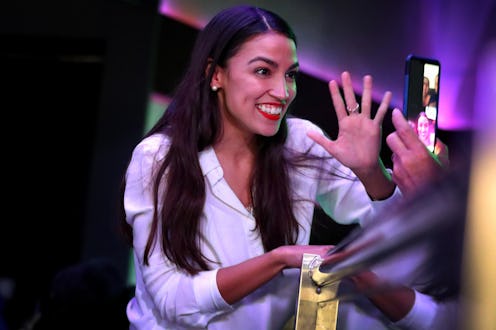News
Newly-Elected Millennials Will Make The Average Age In Congress Drop By A Whole Decade

The current session of Congress is one of the oldest in American history, but that's about to change: Thanks to a crop of newly-elected millennials, the average age of Congress in 2019 will drop by 10 years from what it is now, according to PBS News Hour.
29-year-old Alexandria Ocasio-Cortez made history in the midterms by becoming the youngest woman ever elected to Congress. Once sworn in, she'll be joined by 29-year-old Abby Finkenauer, 32-year-old Lauren Underwood, 33-year-old Xochitl Torres Small and a slate of other newly-elected millennial lawmakers. In total, 25 candidates who were elected for the first time on Tuesday are 40 years old or younger, according to PBS; collectively, these young politicians will lower the average age of federal lawmakers by 10 years once they're sworn in.
This is a huge change, given that Congress has been getting steadily older for decades. Since 1981, the average age of representatives and senators has jumped from 49 and 53, respectively, to 57 and 61, according to Quorum, making the current Congress one of the oldest in history. Tuesday's elections sharply and abruptly reversed that trend.
The upcoming young Congress is the result, in part, of young voters. According to early estimates from the Center for Information and Research on Civic Learning and Engagement at Tufts University, a whopping 31 percent of Americans aged 18-29 voted in Tuesday's midterms, a much higher share in any election since at least the mid-1990s. Two-thirds of them voted for Democrats, according to the same study.
"You have to go back to the '50s to find another year like this," PBS's Lisa Desjardins said in a radio interview. "It's a generational change."
In addition to being younger, the new session of Congress will be the most racially diverse in history, according to the Hill, and include more female lawmakers than ever before.
Those changes, it's worth noting, are exclusively the result of the Democratic Party. The House Democratic caucus will see a net gain of 28 women and 12 people of color once the new Congress is sworn in, Desjardins said. The House GOP caucus, meanwhile, will be even less diverse than it was before, with seven fewer women and three fewer people of color in the new Congress.
Moreover, in terms of representing the country as a whole, Congress still has a long way to go. According to NPR, the new Congress will be 23 percent female; that's an all-time high for Congress, but given that the country as a whole is 50.8 percent women, it's still far from representative.
Desjardins says that she expects the young freshmen Democrats to champion progressive causes with more vigor than their older peers.
"Younger members I think are more interested in some more controversial issues," she told PBS. "We see them talking about guns more, like Jason Crow, who is one of the new Democratic members. And I think that they're going to come in, much as we saw the Republicans who formed the Freedom Caucus a few years ago, and they're going to try to demand more progressive, more aggressive change."